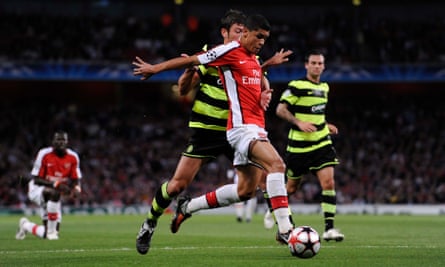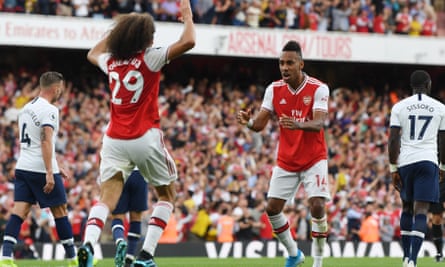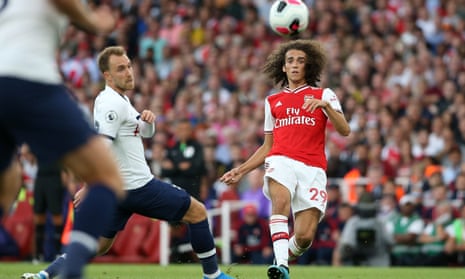In May 2011 Denilson, vexed at playing a bit-part role in another of those frustrating, ultimately shapeless Arsenal seasons either side of the decade’s turn, announced he would be leaving the club. The gist of his explanation, outlined in a national newspaper interview, was thus: he had arrived in London as an 18-year-old with high hopes of winning trophies but, half a decade down the line, no such good fortune had visited him. He would seek a new challenge elsewhere, looking to rekindle the early fire of a youthful gamble that had not quite paid off.
By that point there was little reason for those of an Arsenal stripe to care. Hindsight can justifiably read Denilson’s decline as one of the thousand cuts that splintered Arsène Wenger’s youth project in the years after Arsenal moved to the Emirates Stadium, but he had long since ceased to be held up as a standard bearer for future promise.
It had not always been that way. In the 2008-09 season Denilson, then 20 years of age, spent long stretches manning a midfield shorn of Gilberto and Mathieu Flamini alongside Alex Song, who was only five months older. Much of their football would be ponderous but Arsenal still finished fourth and reached a Champions League semi-final. At a time when not everybody had cottoned on that football’s new wave of statistical measures needed accompanying with a heavy dose of context, it would be breathlessly trumpeted that he touched the ball more times than any other Premier League player in that campaign.

Denilson never found the silverware he craved so at first glance it might be worth tempering expectations of another 20-year-old who, this season, has the ninth-best pass completion tally among Premier League midfielders according to data from Wyscout. The signs are that Matteo Guendouzi is, like Denilson 11 years ago, experiencing a season of arrival as a nailed-on top-flight starter having – again like his predecessor – bedded in during a period of significant change. His performance in the north London derby a fortnight ago made people sit up far beyond Holloway Road. The challenge now is for Guendouzi to rise higher than the Wenger-era brood that fell short.
What might make Guendouzi different? A clue comes from Regis Le Bris, the academy director at Lorient, from where he joined Arsenal last year. “He has always been very cheerful and concerned with his relationship with the staff, and can be a sore loser – the game has always been a serious matter for him,” Le Bris, who remains in contact with Guendouzi, tells the Guardian. “With time he seems to better manage his frustration when he loses … although I am not completely sure of that.”
The latter remark is made in jest but it tallies with the impression that Guendouzi operates with a fire and intensity that sets him apart from his peers. One common complaint about the Denilson-Song vintage was that Arsenal did not detest defeat enough, and that there was not enough pressure applied from within the club to make it hurt. Guendouzi, a hugely driven character who refused to shake the hand of the former Lorient manager Bernard Casoni when he was substituted during a match as a 17-year-old, has had a tendency to take setbacks personally and that is no drawback if channelled positively.
Last season, Guendouzi would offset promising performances with wayward passes and positional errors. While he came through at Lorient, accurate distribution was not a particular strong point. But Le Bris talks of “a rare ability to progress across all dimensions”, especially by quickly correcting the mistakes he has made”. There was a sense towards the end of 2018-19 that Guendouzi went back to basics, playing a safer game, but the early impressions this season are of a more complete package. The perfectly-flighted pass he made for Pierre-Emerick Aubameyang’s equaliser against Spurs, delivered after 71 minutes of probing with far greater insistency than several more senior teammates, felt like confirmation of his ability to influence games at the highest level.
“He’s an ambitious player who wants to contribute to unbalancing the opposition team and create goalscoring chances,” Le Bris says. “Progressively, he has adapted his technique to his intentions. He had to miss many passes to be able to make the one against Tottenham. He is not afraid of making mistakes, and learns very fast.”

Denilson rarely displayed that kind of range or courage from his own deep midfield position, even if he held the fort admirably for a time. Song did, particularly during a period in 2011-12 when he delivered a series of assists to Robin van Persie that bore more than a passing resemblance to that clipped ball for Aubameyang. But Song never made much secret of being a frustrated number 10 and, as his later failure at Barcelona showed, lacked the discipline and consistency needed to establish himself in the top bracket further back.
So there are cautionary tales for Guendouzi and teammates like Joe Willock, who is also 20 and signed a new long-term contract last, to study. Emery has spoken glowingly, by his standards, about both players and the success of his tenure at Arsenal may well be defined by that of what has, in some quarters, been dubbed “project youth 2.0”. Wenger famously said signing Xabi Alonso or Gareth Barry “would have killed Song, Diaby and Denilson”, but ended up overestimating those players’ leadership capacities. Last week Per Mertesacker suggested Guendouzi is capable of being a “future leader”. Those who know Guendouzi suggest he has the potential to step up where those before him fell short.
“In France there is an old adage: ‘La chance sourit aux audacieux’ [‘luck smiles on the one who dares’],” Le Bris says. “That’s a good definition of Matteo. He is able to capture the opportunities that appear to him.” If that continues to be the case, the trophies should come this time and his statistics will require no explanation at all.

Comments (…)
Sign in or create your Guardian account to join the discussion